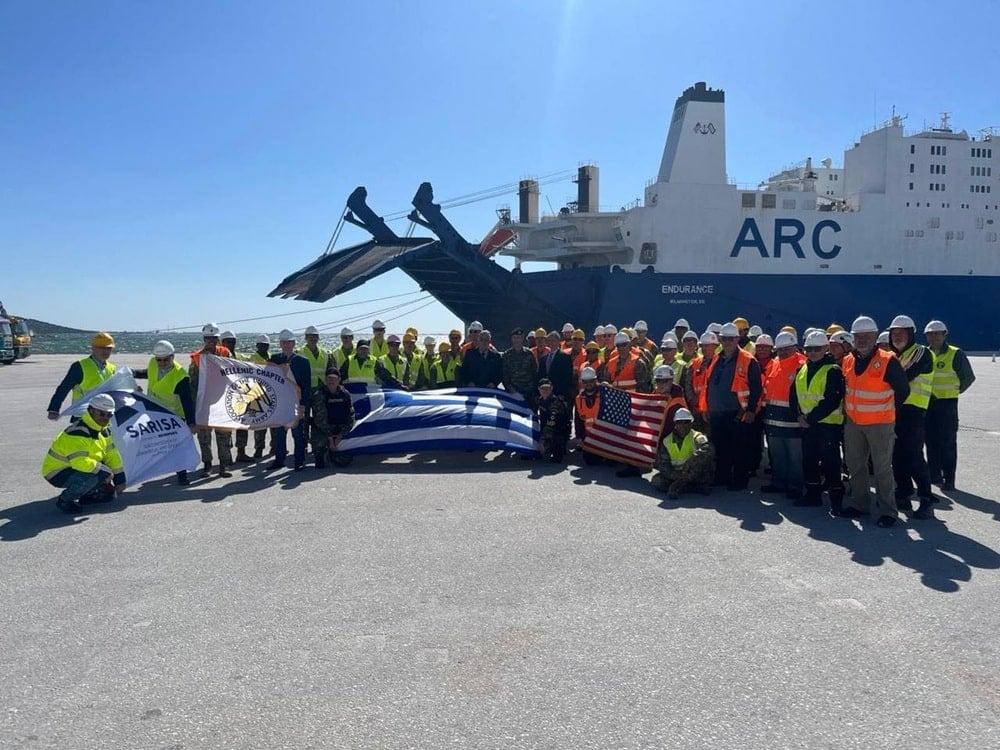

On April 29, the Port of Kavala, northern Greece, achieved a historic milestone by hosting its first-ever US military vessel, the M/V Endurance, signaling the port’s growing strategic role in regional security and commerce. The ship’s arrival was announced by US Consul General in Thessaloniki, Jerry Ismail, who shared the news via social media, highlighting that Kavala is welcoming a U.S. military presence for the first time.
According to Ismail, the move reflects the port’s increasing capability to support not just defense operations, but also critical sectors such as international trade, energy, and transportation. “Security is a shared commitment, and every NATO ally plays a vital role in maintaining peace and stability,” he stated, reinforcing the significance of U.S.-Greece cooperation within the NATO framework.
The event was attended by several prominent figures, including Rear Admiral Ismail of the Hellenic Coast Guard, Major General Ilias Kostakis, and Deputy Mayor of Kavala Panayiotis Aggelidis. Their presence underscored the deepening collaboration between Greek and American authorities in leveraging Kavala as a multipurpose hub for defense and economic activities.

The M/V Endurance’s arrival served as a real-world demonstration of Kavala’s potential as a logistical and operational center. Major General Kostakis emphasized the ever-strengthening U.S.-Greece relationship, while Deputy Mayor Aggelidis noted the economic and geopolitical benefits for Kavala, positioning it as a key node in regional prosperity and security.
Yet, this pivotal development comes amid broader geopolitical uncertainties. Some analysts speculate that the shift toward Kavala may reflect ongoing recalibrations in US foreign policy, particularly under newly elected President Donald Trump.
Questions arise about how these changes may influence the US presence in Northern Greece and whether the strategic role of Alexandroupolis—a port previously central to US and NATO activity—may be diminished in the process.
In 2020, the Endurance delivered 3,000 US Army soldiers, military vehicles and equipment to Alexandroupolis in the NATO exercise dubbed “Atlantic Resolve 2020.”
Adding to the uncertainty is the looming closure of the US Consulate in Thessaloniki. According to a recent report by The New York Times, the consulate is among 17 worldwide that the State Department is considering for closure or consolidation. An internal memo obtained by the paper lists Thessaloniki alongside other European consulates—including several in France, Germany, and Italy—as potential candidates for shutdown.
However, while the recent internal State Department memo has reignited concerns about a potential closure of the US Consulate in Thessaloniki, it’s important to note that such discussions are not new. Reports suggesting the consulate’s possible shutdown have circulated intermittently for more than a decade, yet the post has continued to operate uninterrupted.
As Greece navigates this new phase in regional diplomacy and defense, the developments in Kavala may well signal the beginning of a broader strategic realignment in Southeastern Europe, particularly in light of shifting US foreign policy priorities and the long-term implications of the war in Ukraine.
Related: Suspect Arrested in Greece’s Alexandroupolis for Espionage Tied to Russia
